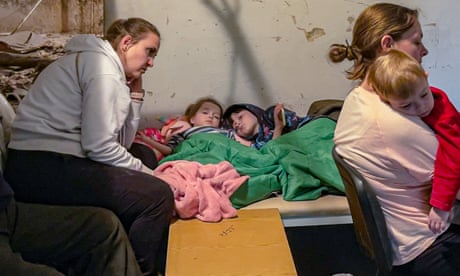- by foxnews
- 23 May 2025
‘We don’t know how to survive here’: a cancer ward for Ukrainian children under siege
‘We don’t know how to survive here’: a cancer ward for Ukrainian children under siege
- by theguardian
- 02 Mar 2022
- in news

On the oncology ward at Chernihiv children's hospital, patients are battling cancer, their city is surrounded by Russian forces, and now they are running out of painkillers and stockpiling food.
"We don't know how much time we have," said Serhiy Zosimenko, a charity worker supporting the 11 patients, their doctors and parents. "We actually don't know how to survive here, It's unreal. We don't have any more resources."
Hospitals in Poland and Slovakia have agreed to continue treatment, waiving any fees, but for now the children - aged between two and 15 - can't get there, because the city is effectively under siege. The only way out would be on a helicopter.
"The problem is we can't evacuate the kids from the ground, we can only evacuate them by air," Zosimenko said. "All routes to our city are mined."
Chernihiv sits about 90 miles north-east of Kyiv, on a road to the Belarusian border. It was surrounded by Russian forces days ago, who have shelled civilian areas, including homes, a kindergarten and a market.
All roads in and out have been laid with explosives to defend the city, the head of the regional administration Viacheslav Chaus said in a post on Facebook.
One Russian rocket landed just short of the cancer patients. "Two days ago a shell hit 200 metres from our hospital - it was a grad rocket," Zosimenko said. He spent the day gathering building supplies to improve the basement bomb shelter, medicines from pharmacies and food.
Community spirit is keeping them going, with pharmacies and other shops donating to meet the hospital needs for free. But some things are already in short supply, particularly painkillers.
"When people are sick with cancer they need a lot of painkiller drugs, and we have a problem with morphine and other drugs," Zosimenko said. "For example the oncology hospital in Chernikiv, they have only eight ampules of morphine or other painkillers."
The hospital wasn't properly prepared for war, with a shelter in such terrible condition that people were getting sick from sleeping there, and haunted by the prospect of Covid adding to their troubles.
So they slept on the first floor and run down each time there is an air raid. "Everyone is tired, especially the medical staff, they don't sleep normally for the last week, just two or three hours," Zosimenko said.
There is extra strain on doctors and nurses because some staff are staying at home with their families, which the others understand.
For those who stayed, and for the patients, they are trying to improve conditions in the basement, plastering the walls, putting in a proper floor, lighting and some beds.
He has been moved by the incredible community spirit at a time of intense pressure; every time he goes to get supplies, from building material yards and pharmacies or supermarkets, everything has been free. "Just take care of those kids," the business owners say.
"I understand that I live in the most wonderful country in the world - 40 million people who care about the people they don't know," he said.
"If Russia can get control of our country, it will only be in one way, that they decide to kill 40 million people, because this country has 40 million people ready to protect it."
He works for a charity, Evum, that supports the paediatric oncology department. Before the war that involved "white collar" work sourcing supplies. Now he is scouring the shops for food and begging for international help to get the children out of the war zone, and preparing - if necessary - to fight.
He's brought his own rifle to the hospital, and together with some of the children's fathers, created an informal protection unit.
"We are here with our own weapons, some of the fathers of these kids bring something so they can protect them too," he said. "We are ready to give our own lives but not willing to give the lives of these children."
"I work with kids, because they are architects, only people who can build the future. We can just help them survive, so they can do what they should do."
He has no regrets, despite the turmoil of the last week, and a growing conviction that many of those bracing to defend their city may not live to see Russia defeated.
"Every time when I came here to this cabinet and see the rifle, it reminds me of what happened here for the last six days, feel some stress inside me. I remember again that someone started war in my country," he said. "If I don't die here in the next two weeks, it's going to be a miracle."
- by foxnews
- descember 09, 2016
United Airlines flight returns to Hawaii after concerning message found on bathroom mirror; FBI investigating
United Airlines Flight 1169 to Los Angeles returned to Hawaii after a "potential security concern" aboard the plane. The FBI and police are investigating.
read more


